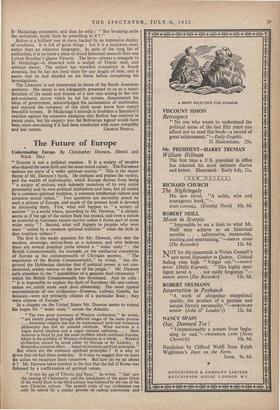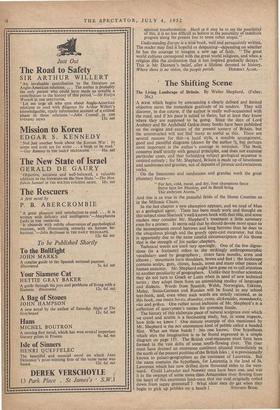The Future of Europe
" EUROPE is not a political creation. It is a society of peoples who shared the same faith and the same moral values. The European nations are parts of a wider spiritual society." This is the major theme of Mr. Dawson's book. He explains and praises the variety, and the wealth of individuality, which Europe derives from being " a society of nations, each intensely conscious of its own social personality and its own political institutions and laws, but all united by a common spiritual tradition, a common intellectual culture and common moral values." Two questions are inevitably posed by such a picture of Europe, and much of the present book is devoted to discussing them. First, what will happen to " a society of nations " in a world where, according to Mr. Dawson, " it already seems as if the age of the nation State has passed, and even a nation as powerful as Germany cannot survive unless it forms part of some wider unity " ? Second, what will happen to peoples who were once " united by a common spiritual tradition " when the faith in that tradition withers ?
The first is the easier question for Mr. Dawson, who sees the modern, sovereign, nation-State as a nuisance, and who believes there are several practical paths toward a " wider unity " : the British Commonwealth, for example, or the mediaeval conception of Europe as the commonwealth of Christian peoples. " The experience of the British Commonwealth," he writes, " has dis- proved the Hobbesian doctrine that if political power is not con- . centrated, society returns to the law of the jungle." Mr. Dawson calls attention to the – possibilities of a genuine dual citizenship " which the British Commonwealth has developed. And he adds : " It is impossible to explain the facts of European life and culture unless we admit some such dual citizenship. The most typical representatives of our civilisation—Erasmus, Leibniz, Goethe, for instance—were not primarily citizens of a particular State ; they were citizens of Europe."
In a chapter on the United States Mr. Dawson seems to extend his hopes for " wider unity " across the Atlantic.
" The two great provinces of Western civilisation," he writes, " are merely passing through different stages of the same process . . American religion has lost its supernatural faith and American philosophy has lost its rational certitude. What survives is a vague moral idealism and a vague rational optimism.. . . Here America is faced by just the same problem which confronts Europe, which is the problem of Western civilisation as a whole . . . Western civilisation cannot be saved either by Europe or by 'America ; it demands a common effort ... based on common spiritual principles." But where are the common spiritual principles ? It is easy to prove that we had them yesterday. It is easy to suggest that we must die unless we recapture them tomorrow. But,how do we set about it ? Mr. Dawson takes comfort in the fact that the fall of Rome was followed by a reaffirmation of spiritual values.
" It was the age of Tiberius and Nero," he writes, " that saw the, coming of Christianity, and the breakdown of the giant fabric of the world State in the third century was followed by the rise of the new Christian culture. The present crisis of our civilisation can only be solved by a similar process of radical conversion and
spiritual transformation. Hard as it may be to see the possibility of this, it is no less difficult to believe in the possibility of indefinite progress along the present line to some robot utopia."
Understanding Europe is a wise book, well and persuasively written. The reader may find it hopeful or despairing—depending on whether he has the courage to imagine a new age of faith. " The great world cultures correspond with the great world religions, and when a religion dies the civilisation that it has inspired gradually decays." This is Mr Dawson's belief, after a lifetime devoted to history. Where there is no vision, the people perish. HERBERT AGAR.



























































 Previous page
Previous page